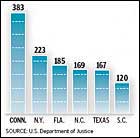 |
 |
|||
|
||||
| Web Sites, Documents and Articles >> Hartford Courant News Articles > | ||
|
Teens In Adult Jails A State Specialty March 22, 2007 Connecticut locks up more minors in adult prisons than any other state in the nation, increasing the likelihood that those teens will be repeat offenders and increasing their risk of abuse, depression and untreated mental illness, a national report released Wednesday said. With violent juvenile crimes declining throughout the U.S., states are reducing the numbers of those under 18 who are incarcerated in adult jails. But Connecticut's incarceration levels have gone up, according to the report produced by the Washington, D.C.-based Campaign for Youth Justice. But Connecticut officials admit the rising numbers are also due to a shortage of suitable programs for children ages 16 and 17 - a situation some lawmakers and advocates want to change by passing a law raising the age for being treated as an adult to 18. The bill is expected to go to a vote before the General Assembly's judiciary committee in the next two weeks. Hector Glynn, executive director of the Bridgeport-based Connecticut Juvenile Justice Alliance, said Connecticut's incarceration of minors in adult prisons and lack of programs for troubled youths comes close to "state-sanctioned child abuse." "We believe to a large degree that this comes very close to a human rights violation," Glynn said Wednesday. "Treating kids as adults and locking them up, if any parent were to do this, it would be considered child abuse." Connecticut was one of seven states whose criminal prosecutions of juveniles were reviewed as part of the Youth Justice study. The others were California, Florida, Illinois, North Carolina, Virginia and Wisconsin. The Campaign for Youth Justice is dedicated to ending the practice of trying, sentencing and incarcerating those younger than 18 in the adult criminal justice system. One of the study's key findings was that Connecticut led the nation in the number of youths under 18 incarcerated in adult prisons with 383 in 2005, the last year for which comparative statistics were available. New York was second with 223. According to the federal Office of Justice Programs, Bureau of Justice Statistics, the number of children incarcerated with adults in Connecticut went up 19 percent between June 2004 and June 2005, while they declined in most states. "Connecticut's policy is really concerning," said Liz Ryan, Campaign for Youth Justice's executive director. "It's really behind the rest of the nation in terms of its treatment of 16- and 17-year-olds in the adult prison system, and its numbers of incarcerated young people are going up while the rest of states' numbers are going down." The national study found that most children pushed into the adult criminal justice system wind up there for nonviolent offenses. In Connecticut, 96 percent of the approximately 13,000 youths entering the adult criminal justice system each year come there for nonviolent offenses, the study showed. The prosecution of offenders under 18 as adults is particularly damaging to youths of color, the report said. In Connecticut, blacks and Latinos constitute less than 30 percent of the total youth population but they make up 80 percent of the young men in the adult correction system, the report said. The Youth Justice report also said locking youths up with adults does not make communities safer. The report cited a study comparing recidivism of youths waived to adult criminal court in Florida with those retained in juvenile court. The study found that those in the adult group were more likely to be rearrested and commit more serious new offenses. Some states, including Wisconsin and North Carolina, have set up separate facilities in the adult prison system for youths prosecuted as adults. But in Connecticut, youths charged as adults are sent to the Manson Youth Institution in Cheshire, a high-security prison for inmates up to age 21. Inmates under 18 constitute about 2 percent of the total inmate population in adult prisons, which means the system has 50 adult inmates for every minor. Critics charge that youths in adult prisons are exposed to potential sexual and physical abuse and have much less access to counseling programs suitable to their age. The lack of services was highlighted in July 2005, when 17-year-old David Burgos of Bristol committed suicide at Manson while being held on a probation violation. William Carbone, director of court support services for the state judicial branch, admitted the state lacks services to divert 16- and 17-year-olds from adult prisons when they get into trouble with the law. It is something judicial officials are working hard to change, he said. As one of the examples of the hurdles court officials face, Carbone said current state law does not allow 16- and 17-year-olds to access services through the state Department of Mental Health and Addiction Services. They must be 18 to be eligible. "Our services for 16- and 17-year-olds are minimal," Carbone said. "So when you're faced with someone who has committed a crime and been convicted, if you don't have programs appropriate for that age group, you're going to see more of them incarcerated." State Rep. Toni Walker, D-New Haven, one of the leading proponents of the Raise the Juvenile Age bill, said the state can't keep spending millions on prisons to support a correction system that has basically become a "bottomless pit." The Youth Justice report said that returning 16- and 17-year-olds to the juvenile justice system would result in a $3 savings for every dollar spent.
|
||
| Last update:
September 25, 2012 |
|
||
|
 State judicial officials say the numbers are higher because Connecticut is one of only three states that automatically prosecute children 16 and older as adults. New York and North Carolina are the others.
State judicial officials say the numbers are higher because Connecticut is one of only three states that automatically prosecute children 16 and older as adults. New York and North Carolina are the others.